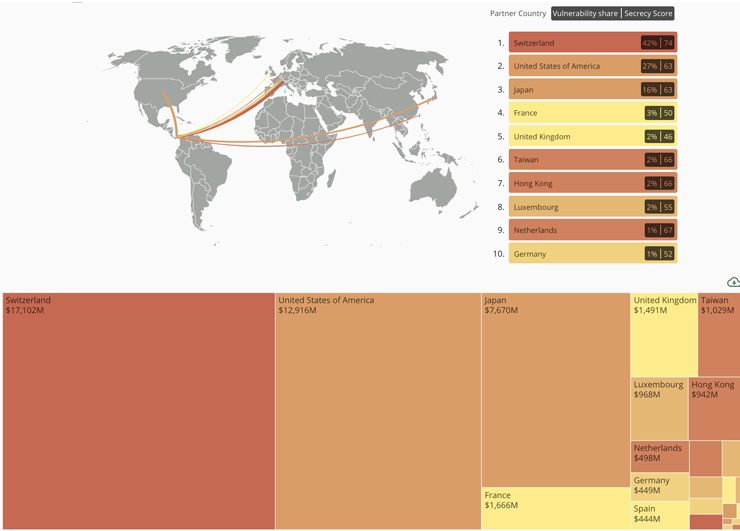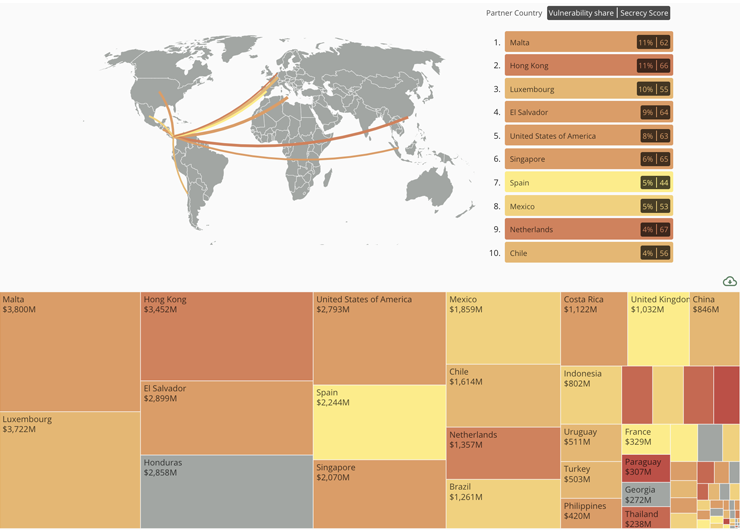
Luke Holland ■ Taking Panama to task: Women’s rights trampled by financial secrecy

Just over four years have passed since a huge archive of secret documents from the Panamanian law firm Mossack Fonseca, containing wide-ranging details of fraud, tax evasion and other illegal financial schemes, were leaked to a German newspaper provoking a global scandal. The public outcry that followed embroiled political leaders, celebrities and business titans from across the world, while the Panamanian Government itself faced intense international pressure over its facilitation of shady cross-border finance.
In the years since, Panama has taken some tentative steps towards cleaning up its act, but these have been manifestly inadequate to make a meaningful difference. Moreover, the country’s continuing facilitation of financial secrecy is likely to be undermining human rights in many other jurisdictions. As demonstrated in a new Tax Justice Network submission to the UN Committee on the Elimination of Discrimination Against Women, Panama’s financial system continues to expose other countries to a significant risk from illicit financial flows. This includes abusive cross-border tax practices, which syphon away resources needed for the fulfilment of women’s rights.
The extraterritorial impacts of both corporate tax havens and financial secrecy jurisdictions have become an issue of increasing concern to human rights monitoring bodies in recent years. International human rights law makes it clear that states have a duty to cooperate to maximise the resources available for the fulfilment of human rights, and to take action to prevent behaviours by private actors within their jurisdictions that might be harmful to human rights “regardless of whether the affected persons are in their territories”.
In order for tax authorities to be able to determine who owes what in their jurisdiction, they need to know who are the real beneficial owners of companies, trusts and foundations – both those that are registered within their borders and those foreign entities with financial links to their territory. Corporations and economic elites seeking to avoid paying their fair share of tax, often by transferring their wealth out of the country where it was generated, use complex legal structures and vehicles to conceal this information.
Private foundations are one such device, and Panama hosts some 55,000 of these, making it second only to the Netherlands in fuelling the proliferation of these vehicles. Furthermore, the country only records partial registry of the ownership of these, and thereby leaves them wide open for abuse. It also hosts some 350,000 secretive ‘International Business Corporations’, making it the third largest enabler of these opaque entities in the world, after Hong Kong and the British Virgin Islands. Another popular strategy for hiding assets from regulatory authorities is bearer shares, which make it impossible to ascertain real beneficial owners. While Panama recently introduced new laws to limit these nefarious structures, they still don’t require the beneficial owners to be registered with the government.
As a result of these facts, it is likely that Panama is still providing safe harbour to stolen tax revenue, and other illicit financial flows. Tax Justice Network’s newly-launched Illicit Financial Flows Vulnerability Tracker likewise suggests the country plays a significant role in facilitating questionable resource flows to and from other countries. The tracker, which combines metrics on the volume of financial transactions with the level of secrecy among its trading partners, provides a measure of the risk of illicit flows. As illustrated in the graphics below, in 2018 Switzerland was the largest recipient of outward bank deposits from Panama. Huge flows of outward direct investment from Panama to other secrecy jurisdictions and tax havens – including Malta, Luxembourg and Hong Kong – are also apparent, again raising questions as to whether any of this torrent of revenue might in fact be due to government coffers elsewhere.


What’s more, Panama’s finance-centered development strategy seems to have brought little benefit for ordinary people living in the country, much less marginalised groups such as women and indigenous communities. A recent country review by the World Bank noted stark and persistent regional inequalities, with much higher poverty rates in rural areas where indigenous communities are largely located. Indeed, the rate of extreme poverty stood at 24.8 percent in rural areas in 2016, as compared to just 2.8 percent in cities.
In indigenous towns and villages, known as camarcas, poverty stood at a staggering 70 percent with extreme poverty at 40 percent. Meanwhile, the World Bank also reports that maternal mortality among indigenous women in rural areas is four times higher than that experienced by urban populations.
As detailed in our submission, these concerns were raised by the Independent Expert on the effects of foreign debt after his mission to Panama in 2017, when he noted that persistently high levels of inequality are evident in a context where “economic policy choices seem to continue favoring wealth consolidation and growth in the hands of a very few”. The Independent Expert also emphasised that women, who account for over 60 percent of single-parent households, should be prioritised in poverty reduction efforts.
Being mindful that women are under-represented in the financial sector the world over, the picture that emerges is one in which, despite some progress in reducing overall poverty levels, women and girls have been largely excluded from Panama’s finance sector-driven growth.
The country’s appearance before the CEDAW Committee will offer an important opportunity for one of the UN’s key human rights oversight bodies to interrogate both Panama’s failure to adequately protect women’s rights within its borders and its continuing role in undermining these rights internationally through the facilitation of deleterious financial practices.
The 76th Session of the CEDAW Committee, which has been postponed due to the Coronavirus pandemic, is due to be rescheduled soon. For a more thorough analysis of the women’s rights issues at stake in Panama’s financial secrecy regime, and recommendations on what needs to change, you can download our submission to the CEDAW Committee, which was produced with the support of the Financial Transparency Coalition, here.
Photo of Panama City courtesy of Francisco Rioseco/Unsplash
Related articles
One-page policy briefs: ABC policy reforms and human rights in the UN tax convention
Tax justice pays dividends – fair corporate taxation grows jobs, shrinks inequality

Reclaiming tax sovereignty to transform global climate finance

The Financial Secrecy Index, a cherished tool for policy research across the globe

Uncovering hidden power in the UK’s PSC Register

Lessons from Australia: Let the sunshine in!

Vulnerabilities to illicit financial flows: complementing national risk assessments
UN Submission: A Roadmap for Eradicating Poverty Beyond Growth
A human rights economy: what it is and why we need it


